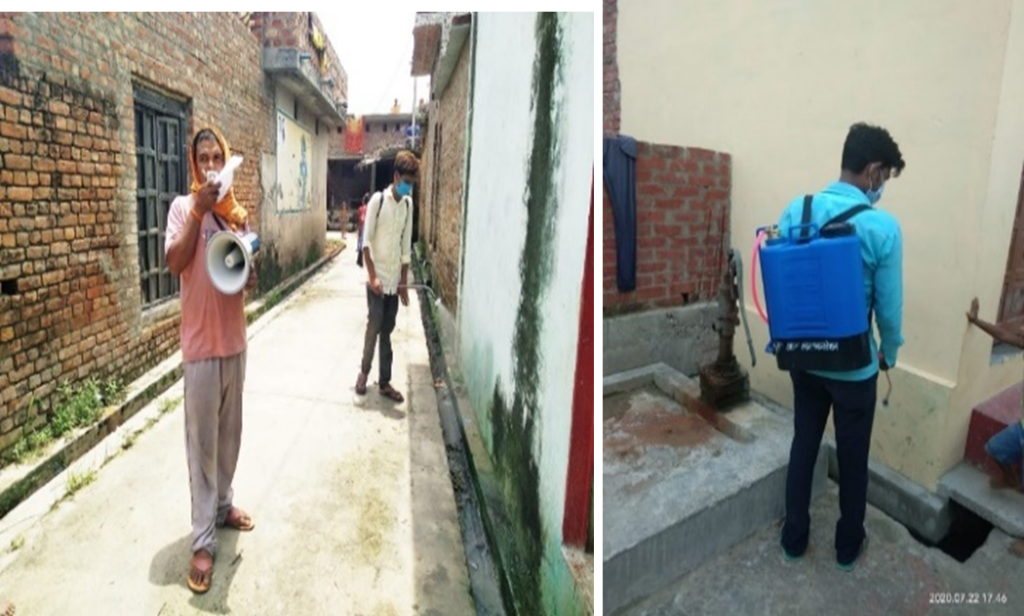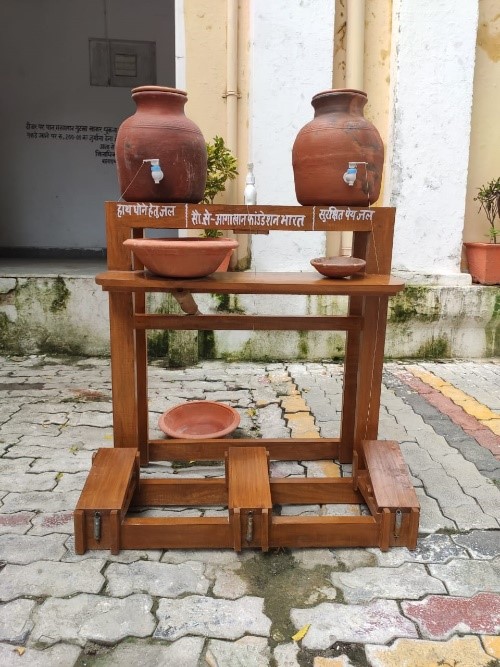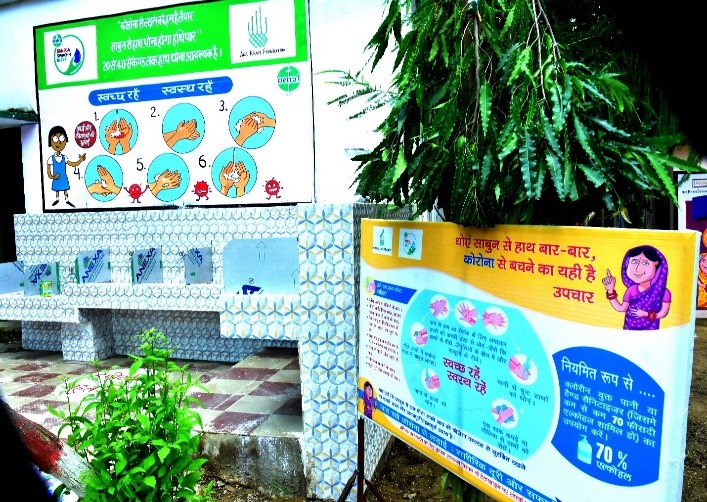Since 2015, the Aga Khan Foundation (AKF) has been implementing a flagship comprehensive WASH initiative in response to the Swachh Bharat Mission, across five states (Uttar Pradesh, Bihar, Gujarat, Madhya Pradesh, and Maharashtra). The objective has been to improve the quality of life in the communities where it maintains a long-term committed presence, by ensuring sustained access to sanitation and hygiene. Over the five-year period, this was ensured for over 150,000 households, across AKF’s implementation states.
Building further on the back of this initiative, and responding to the current COVID-19 outbreak, AKF has been implementing its COVID-19 response in Uttar Pradesh and Bihar, by ensuring access to safe water, adequate sanitation and hygiene services for the targeted population. Through a multi-pronged approach, AKF has also intensified the behaviour improvement initiatives and awareness-raising campaigns on the need of physical distancing, respiratory hygiene and hand washing at the household and in institutions. For frontline health and sanitation workers, provisions of Personal Protective Equipment (PPE)/hygiene kits and orientation on safety measures have also been prioritised.
To guide its COVID-19 response strategy, AKF undertook a rapid assessment in April across 4 districts of Uttar Pradesh and Bihar in order to understand WASH and COVID-19-related community-level constraints. Through phone consultations AKF interviewed frontline workers, ragpickers and sanitary workers, healthcare facility providers, managers of quarantine centre and community members including school management committee members, ward councillors, self-help group members and young adolescent girls. It was found that there are:
- Gaps in water, sanitation, and hygiene service delivery – significant challenges were felt by residents of informal slum settlements, with no access to separate handwashing facilities and soap/disinfectants, limited access to community or mobile toilets. Physical distancing was not being followed at community toilet and water points due to overcrowding.
- Need for information and awareness building amongst communities – in the absence of robust communication efforts within communities, myths and misconceptions were found in individual and group behaviours related to COVID-19.
Based on its initial findings from the rapid assessment AKF prioritised a multi-node response initiative with a key focus on:
1. Risk communication using audio messages and digital posters on COVID-19
AKF developed COVID-19 compliant hygiene messages tailored to the local context and improve the communication of appropriate information, using multiple delivery channels (digital, reminder media such as signages/billboards/ wall paintings, public address system, onsite demonstration), for targeted communities and at-risk groups. A package of communication tools including digital posters and audio messages were developed on 8 core themes.

This included hygiene during water collection/handling; during use of community toilets; handwashing, importance of physical distancing, respiratory hygiene, and precautions at healthcare facilities and management of waste at health care facilities. As a first step, AKF team prepared a database of around 22,000 functionaries, which included contacts of frontline workers, elected members, government officials and community leaders.
This database was further used to share government advisories, and updated information and communication on COVID-19. Once AKF’s materials were developed, it launched a systematic information, education and communication (IEC) campaign focussed on healthcare service providers, healthcare facility staff, community health workers, communities, and sanitation workers, using different means of WhatsApp, bulk SMS and other mediums, reaching over 40,000 people.
2. Capacity building of government employees on COVID-19
AKF has also oriented over 7226 Government frontline functionaries on COVID-19 response planning and relief measures. These include Chief Development Officers, Block Development Officers, ASHA (community health workers), Angandwadi (childcare centres) workers, and Secretary and Gram Pradhans (elected heads of villages) amongst others. The orientations focussed on building an understanding of transmission of infection, mapping of the illness, prevention measures (hand and respiratory hygiene), general guidance on ‘do’s and ‘don’t’s, importance of handwashing, precautionary measures for health workers, preparation of disinfectants, and safe disposal of COVID-19 waste.

3. Enabling access to PPE and hygiene materials
In line with government requests, AKF made available 8000 facemasks, 2500 gloves and sanitisers, 51,000 soaps to essential service providers such as government frontline workers as well as sanitation workers and ragpickers. This is enabling them to continue their work with proper precautions in these critical times.

4. Extending support to districts to launch a hygiene and disinfection campaign to build community resilience against COVID-19
AKF also designed and initiated a 15-day COVID-19 and awareness campaign in close collaboration with the District Governments of Bahraich, Shrawasti, and Balrampur. As part of AKF’s support, the following hygiene resources (such as foot-operated handwashing stations, sprayer machines, hypochloride solution, megaphones) were shared with the governments with a view to advocate for their widespread usage.
Linked with this, orientation of Pradhans were undertaken to motivate them to undertake several community level activities around sanitisation of common places, cleanliness around water sources, segregation of waste and safe disposal, promotion of handwashing with soap with a view to create COVID-19 WASH-secure villages. During the current crisis AKF team innovatively designed foot-operated “no touch” handwashing stations and placed these at high footfall zones.

In three districts of Uttar Pradesh, AKF installed 31 handwashing stations, covered all 28-community health centres, district hospitals and district development offices. Along with the stations, posters on handwashing were also strategically placed to remind people to wash their hands. Additionally, teams have also created cost effective wooden handwashing models, installing them in communities, near handpumps and in-front of households to enable access to soap and water.

These efforts have been supplemented by community-level demonstrations on handwashing, which have been carried out in villages and urban wards. Teams have also been involved in conducting disinfection drives in project villages using spray machines (1% hypochloride solutions) at key locations such as water sources, Public Distribution System (PDS) stores, banks, and other prominent footfall zones.

5. Strengthening school-level preparedness to enable access to hygiene services, through advocacy measures
In times of COVID-19, recognising the importance of WASH access, disinfection, and emphasis on physical distancing, AKF has introduced a slew of behavioural and architectural nudges that re-emphasise these measures, and help schools become WASH COVID-19 compliant, and better prepared to welcome students back. In Uttar Pradesh, AKF is working closely with the District Education Department to advocate improvements in WASH access within schools, by leveraging funds under Project Vidayala Kayakalp, a flagship programme of the Indian Government to facilitate improvements in school WASH access. Project teams have used this as an opportunity to advocate for improved hygiene services such as handwashing stations in schools, allocation of budgets for WASH, and disinfection, and overall improvements in WASH infrastructure, highlighting the critical role these services can play in serving as barriers to infection transmission in times of COVID-19.

In these schools, AKF has also demonstrated handwashing stations, where washbasins are separated by fibre sheets to ensure proper protection for children while washing hands.
Under AKF’s larger WASH intervention, solar and electricity-based dual power supply options are provided in select location to ensure uninterrupted water supply for handwashing and drinking water in schools. Within these schools, AKF has demarcated the hotspots for regular surface disinfection within the school premises: these include areas where food is prepared/served, toilets, handwashing and assembly/play areas and placed nudges and signage outlining the need for 6-feet distancing.
Recognizing that teachers will play a critical role, AKF has also recently undertaken an orientation of teachers on hygiene education and building their awareness on COVID-19 precautions. It has also oriented school children to become agents of change who can take hygiene messages back into their homes and families. Towards this, AKF has been using a multi-node communication approach to reach out to children, their parents, and the wider community during this time, which includes messaging through WhatsApp and phone networks, and using the platform of hygiene ambassadors. These hygiene ambassadors are key as it is through them that the teams have been able to reach out to the communities with key messages of hygiene and handwashing.
Lessons learnt
The AKF experience in responding to current pandemic clearly suggests that targeted messaging, demonstration of appropriate and cost-effective technologies and system strengthening could have a positive impact in strengthening preventive measures to minimise the infection at community and institutional level.
Credit for all images included in this blog: KF Field Team/Aga Khan Foundation India



